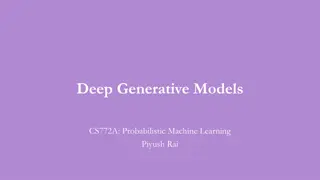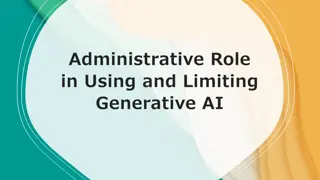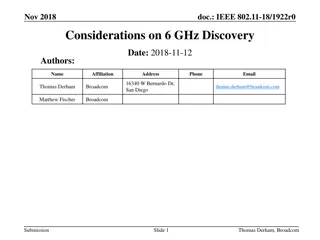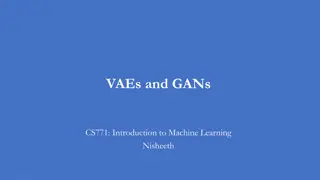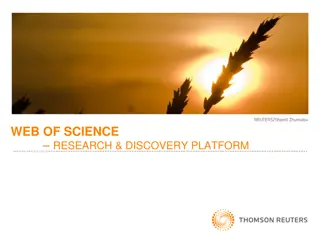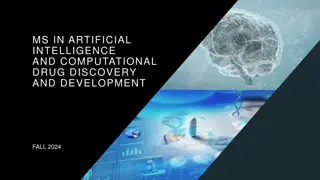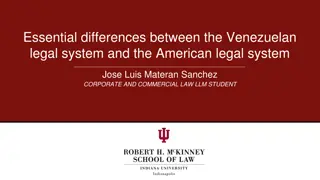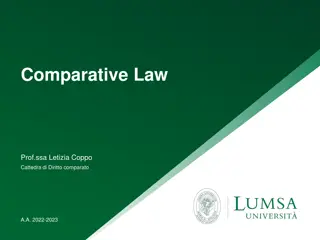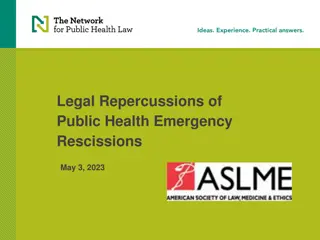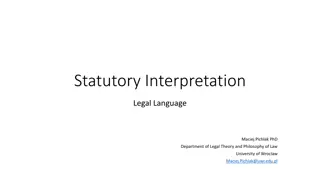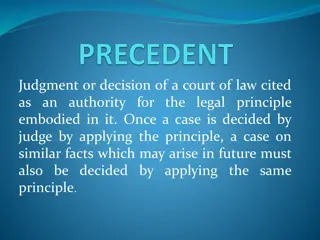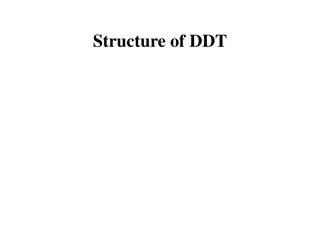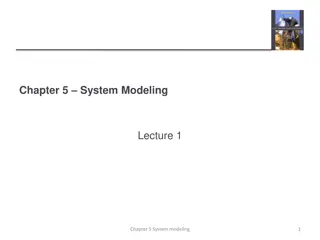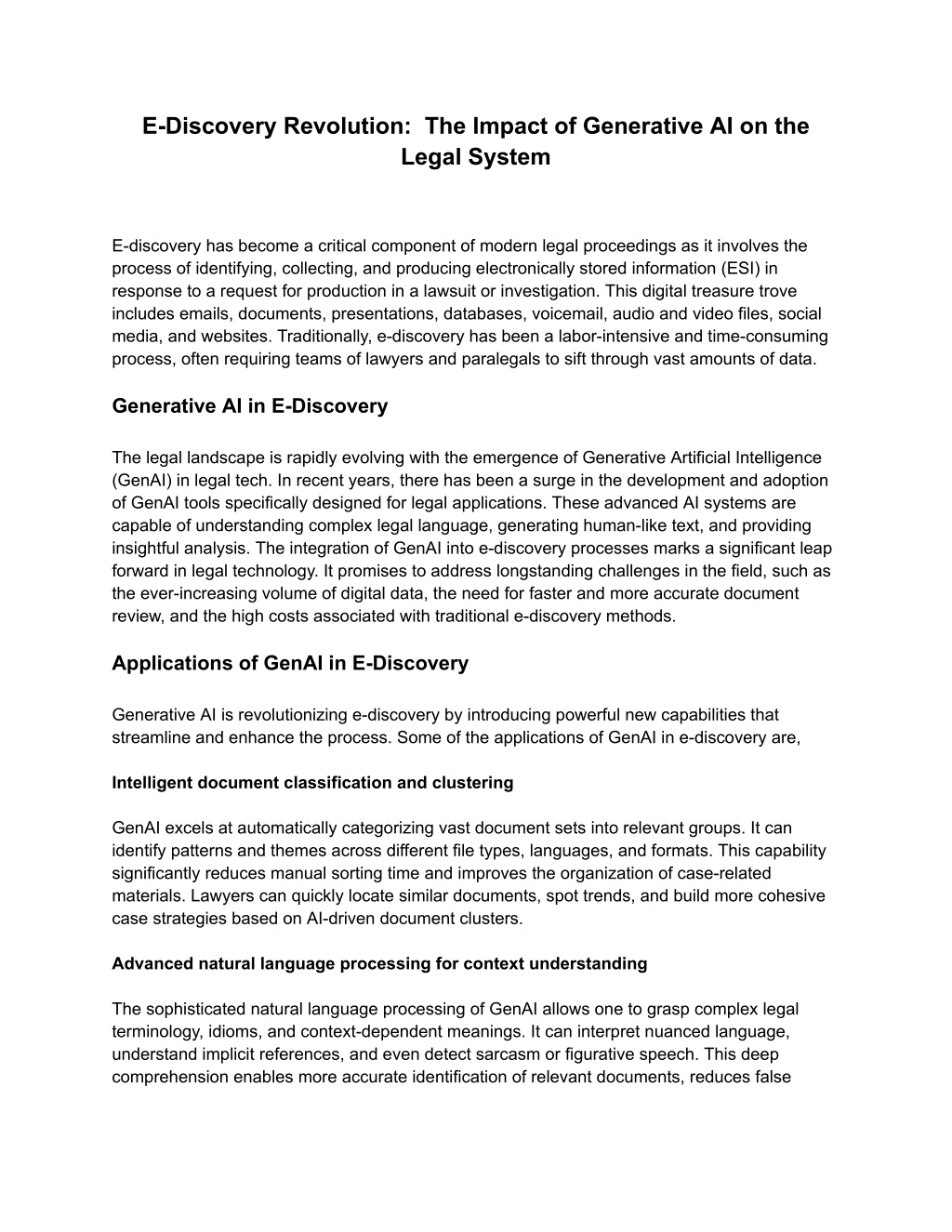
E-Discovery Revolution_ The Impact of Generative AI on the Legal System
Discover how generative AI is transforming the legal industry by revolutionizing e-discovery processes. This groundbreaking technology enhances efficiency, accuracy, and speed in managing vast amounts of legal data, reshaping traditional legal practi
- GenAI in EDiscovery
- GenerativeAI
- GenAI in Legal
- AI
- Artificial Intelligence
- Technology
- Business
- USA
- Entrepreneur
Download Presentation

Please find below an Image/Link to download the presentation.
The content on the website is provided AS IS for your information and personal use only. It may not be sold, licensed, or shared on other websites without obtaining consent from the author. Download presentation by click this link. If you encounter any issues during the download, it is possible that the publisher has removed the file from their server.
E N D
Presentation Transcript
E-Discovery Revolution: The Impact of Generative AI on the Legal System E-discovery has become a critical component of modern legal proceedings as it involves the process of identifying, collecting, and producing electronically stored information (ESI) in response to a request for production in a lawsuit or investigation. This digital treasure trove includes emails, documents, presentations, databases, voicemail, audio and video files, social media, and websites. Traditionally, e-discovery has been a labor-intensive and time-consuming process, often requiring teams of lawyers and paralegals to sift through vast amounts of data. Generative AI in E-Discovery The legal landscape is rapidly evolving with the emergence of Generative Artificial Intelligence (GenAI) in legal tech. In recent years, there has been a surge in the development and adoption of GenAI tools specifically designed for legal applications. These advanced AI systems are capable of understanding complex legal language, generating human-like text, and providing insightful analysis. The integration of GenAI into e-discovery processes marks a significant leap forward in legal technology. It promises to address longstanding challenges in the field, such as the ever-increasing volume of digital data, the need for faster and more accurate document review, and the high costs associated with traditional e-discovery methods. Applications of GenAI in E-Discovery Generative AI is revolutionizing e-discovery by introducing powerful new capabilities that streamline and enhance the process. Some of the applications of GenAI in e-discovery are, Intelligent document classification and clustering GenAI excels at automatically categorizing vast document sets into relevant groups. It can identify patterns and themes across different file types, languages, and formats. This capability significantly reduces manual sorting time and improves the organization of case-related materials. Lawyers can quickly locate similar documents, spot trends, and build more cohesive case strategies based on AI-driven document clusters. Advanced natural language processing for context understanding The sophisticated natural language processing of GenAI allows one to grasp complex legal terminology, idioms, and context-dependent meanings. It can interpret nuanced language, understand implicit references, and even detect sarcasm or figurative speech. This deep comprehension enables more accurate identification of relevant documents, reduces false
positives, and helps uncover subtle connections between seemingly unrelated pieces of information. Automated summarization of large document sets GenAI can rapidly digest extensive document collections and generate concise, accurate summaries. These AI-created summaries highlight key points, identify main arguments, and extract crucial details from lengthy texts. This feature saves lawyers considerable time in reviewing documents, allows for quicker case assessment, and facilitates more efficient information sharing among legal teams. Predictive coding and relevance ranking GenAI enhances predictive coding by learning from human reviewers' decisions to better identify relevant documents. It can assign relevance scores to unreviewed documents, prioritizing those most likely to be important. This AI-driven approach significantly speeds up the review process, reduces human error, and can adapt to evolving case needs, ensuring that critical information is not overlooked. Future Of E-Discovery - Fully Automated E-Discovery Processes The future of e-discovery is trending towards comprehensive automation, leveraging advanced AI to handle the entire process with minimal human intervention. This level of automation presents exciting possibilities for efficiency and cost reduction. It also raises important considerations about the role of human judgment in legal processes. This evolution revolutionizes legal discovery in several ways. End-to-end automation: AI systems may soon manage the complete e-discovery lifecycle autonomously, from initial data collection and processing to final production. This would include automated legal holds, data preservation, and collection from various sources. Self-learning document review: Advanced machine learning algorithms could continually improve their understanding of case-specific nuances by adapting their review criteria without human retraining. This self-improving capability would enhance accuracy and relevance over time. Automated privilege detection: AI could develop sophisticated models to identify privileged information accurately, reduce the risk of accidental disclosure, and streamline the privilege review process. Intelligent data synthesis: In the future, AI might not only identify relevant documents but also synthesize information across them, automatically generating case summaries and timelines, and even suggesting legal strategies.
Cross-lingual and multi-format analysis: Fully automated systems could seamlessly handle documents in multiple languages and formats like audio and video, without the need for human translators or format conversion. Predictive case outcome analysis: By analyzing vast amounts of case law and the specifics of the current case, AI could provide predictive insights on potential case outcomes, informing legal strategies. Automated compliance checks: AI could ensure that the e-discovery process adheres to all relevant legal and ethical guidelines by flagging potential issues for human review. Real-time adaptive discovery: As new information comes to light during a case, AI systems could automatically adjust their discovery parameters and re-analyze existing data in real time. Why Choose Osiz For Your AI-based E-Discovery Services? Osiz stands at the forefront of Generative AI development by delivering cutting-edge AI-based solutions to clients worldwide. Our expertise in Generative AI has revolutionized the e-discovery process, offering unparalleled efficiency and accuracy in legal document review. Our dedicated team of AI specialists and legal tech experts work closely with law firms and corporate legal departments to seamlessly integrate GenAI into their e-discovery workflows. This collaboration ensures a smooth transition and maximizes the benefits of AI-driven discovery. By hiring our expert team, we ensure that your e-discovery process is as efficient, accurate, and cost-effective as possible. Perks you gain from us. Customized AI models tailored to your specific case requirements Significant time and cost savings through automated document analysis Enhanced accuracy in identifying relevant and privileged information Scalable solutions that adapt to cases of any size or complexity Ongoing support and updates to keep your e-discovery process cutting-edge Round-the-clock support for all your AI-based needs. Other services we offer, AI Development Company Game Development Metaverse Development Crypto Exchange Development
Blockchain development services Source: https://www.osiztechnologies.com/blog/generative-ai-in-e-discovery

